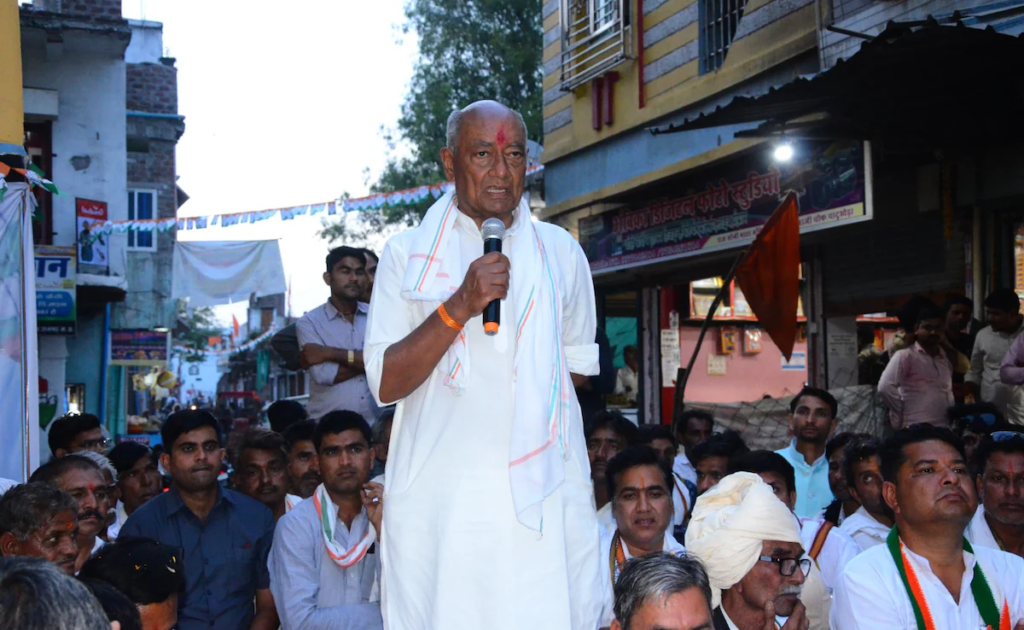Great Digvijaya Singh’s Initiative
Great-In a significant departure from conventional electoral strategies, senior Congress leader Digvijaya Singh has proposed a distinctive plan aimed at reverting to traditional ballot paper voting for at least one constituency in the upcoming Lok Sabha elections. His proposal, centered around fielding a staggering 400 candidates for the Rajgarh Lok Sabha seat, seeks to eliminate the usage of Electronic Voting Machines (EVMs) and reinstate the use of ballot papers in the electoral process.

Great-Digvijaya Singh, the former Chief Minister of Madhya Pradesh and a seasoned politician at 77, is set to contest from his family’s ancestral seat of Rajgarh. The seat holds sentimental value for Singh, having been previously won by him in 1984 and 1991, and subsequently by his brother Laxman Singh from 1994 to 2004. Despite initial reluctance, Singh has decided to challenge the incumbent BJP MP Rodmal Nagar in the upcoming elections.
Great-Commencing his campaign with a ‘Vadha Nibhao Padyatra’, Singh embarked on a mission to highlight the unfulfilled promises of the ruling Bharatiya Janata Party (BJP) made prior to the last year’s Assembly election. Speaking to NDTV during his campaign trail, Singh articulated his vision of contesting with 400 candidates for the Rajgarh Lok Sabha seat, emphasizing the necessity to revert to ballot paper-based voting.
Great-Explaining his rationale behind the proposal, Singh stated that with 400 candidates in the fray, the election would be conducted using the traditional ballot paper system, effectively rendering the EVMs obsolete. He suggested the initiation of a crowdfunding campaign to finance the endeavor, highlighting the nominal security deposit required for each candidate, which could be facilitated through public donations. Singh firmly believes that reverting to ballot paper voting would undermine the BJP’s electoral prospects.
Great-Singh’s skepticism towards EVMs is shared by several members of his party and other opposition leaders, who have consistently alleged tampering and manipulation of the electoral process by the BJP. His stance gained further traction following a mock poll conducted by experts from Gujarat, which purportedly demonstrated vulnerabilities in the EVMs.
Great-Currently, the EVM models in use can accommodate up to 384 candidates at a single polling station by connecting multiple balloting units to a master control unit. However, Singh remains unconvinced about the accuracy and transparency of EVMs, particularly in light of the Congress party’s significant defeats in the Madhya Pradesh, Rajasthan, and Chhattisgarh elections last year.
Great-Taking to social media platform X (formerly Twitter), Singh reiterated his long-standing opposition to EVMs, citing concerns about their susceptibility to hacking and the potential threat they pose to democracy. His electoral setback in the 2019 Bhopal election further reinforced his skepticism towards EVMs, prompting him to urge voters to hold the incumbent government accountable for its unfulfilled promises.
In response to Singh’s proposal, the BJP has downplayed his concerns, with the party’s state chief, VD Sharma, accusing Singh of undermining the constitutional framework and resorting to falsehoods. Sharma dismissed Singh’s assertions and questioned his integrity, alleging a lack of faith in democratic institutions.
Despite facing criticism from his political adversaries, Singh remains resolute in his endeavor to promote transparency and fairness in the electoral process. The Rajgarh constituency, comprising eight Assembly segments across three districts, is scheduled to go to polls in the third phase of the Lok Sabha elections. With the elections slated to commence on April 19 and results expected on June 4, Singh’s initiative has sparked a renewed debate on the efficacy of EVMs and the merits of reverting to traditional ballot paper voting.
In conclusion, Digvijaya Singh’s proposal to contest with 400 candidates for the Rajgarh Lok Sabha seat represents a bold attempt to challenge the status quo and reinstate confidence in the electoral process. While his initiative has been met with skepticism and criticism, it underscores the pressing need to address concerns surrounding EVMs and uphold the principles of democracy. As the electoral battle unfolds, Singh’s campaign serves as a poignant reminder of the ongoing struggle for electoral integrity and transparency in India’s democratic landscape.

[…] rare seismic event shook the Northeastern region of the United States on Friday morning, registering at a magnitude of 4.8 on the Richter […]